Analysis of Christian Worldview and Ethics in Healthcare Context
VerifiedAdded on 2023/04/19
|10
|2296
|376
Essay
AI Summary
This essay provides a detailed reflection on Christian worldview and its implications for healthcare ethics, contrasting it with postmodern relativism and exploring the concept of scientism. The author delves into personal perspectives on fundamental worldview questions, including the nature of ultimate reality, the universe, human existence, knowledge, ethics, and the purpose of life. The reflection draws upon provided study materials to support its arguments, offering a comprehensive analysis of the intersection between faith, ethics, and healthcare practices. Desklib provides a platform for students to access similar solved assignments and resources for their academic needs.
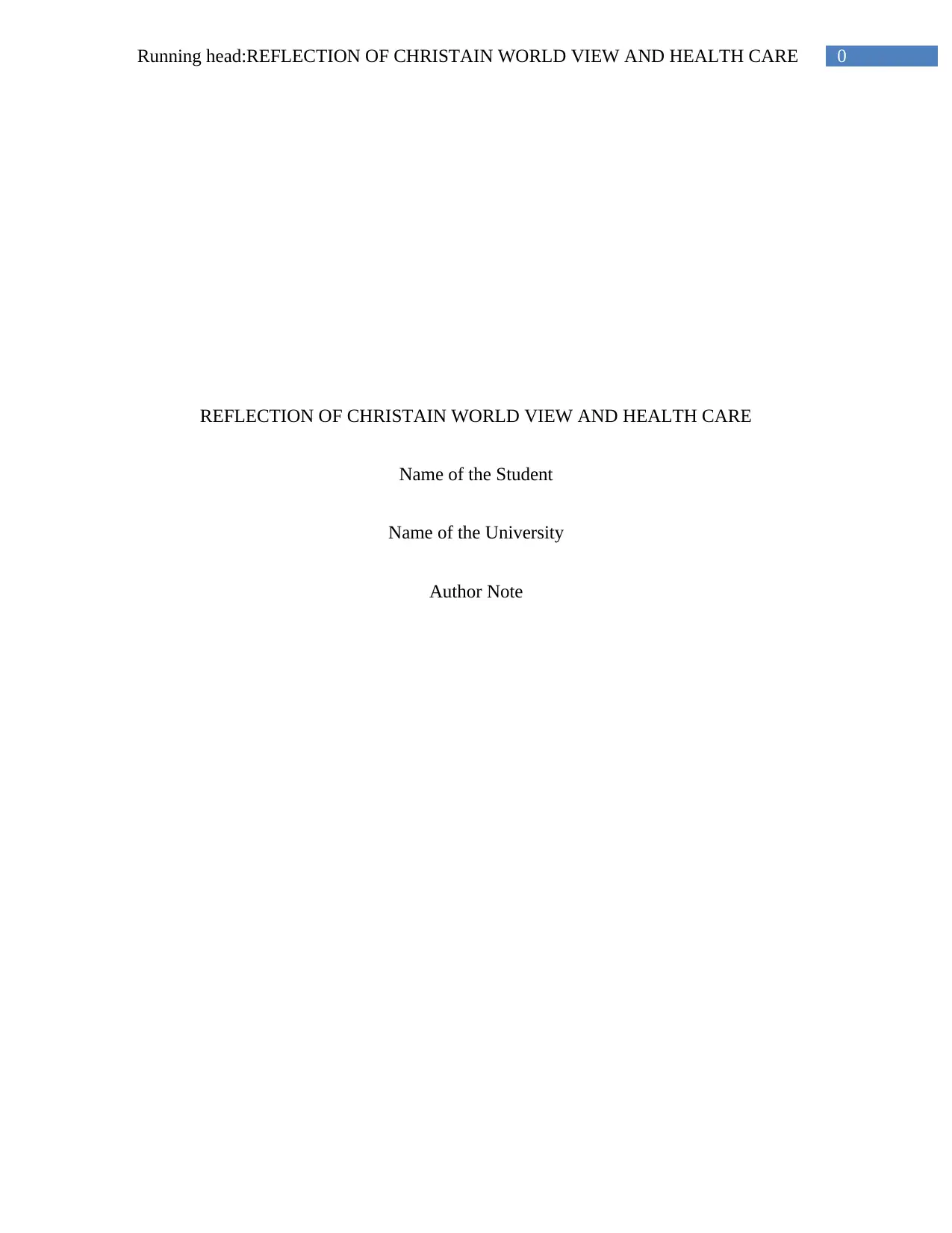
0Running head:REFLECTION OF CHRISTAIN WORLD VIEW AND HEALTH CARE
REFLECTION OF CHRISTAIN WORLD VIEW AND HEALTH CARE
Name of the Student
Name of the University
Author Note
REFLECTION OF CHRISTAIN WORLD VIEW AND HEALTH CARE
Name of the Student
Name of the University
Author Note
Paraphrase This Document
Need a fresh take? Get an instant paraphrase of this document with our AI Paraphraser
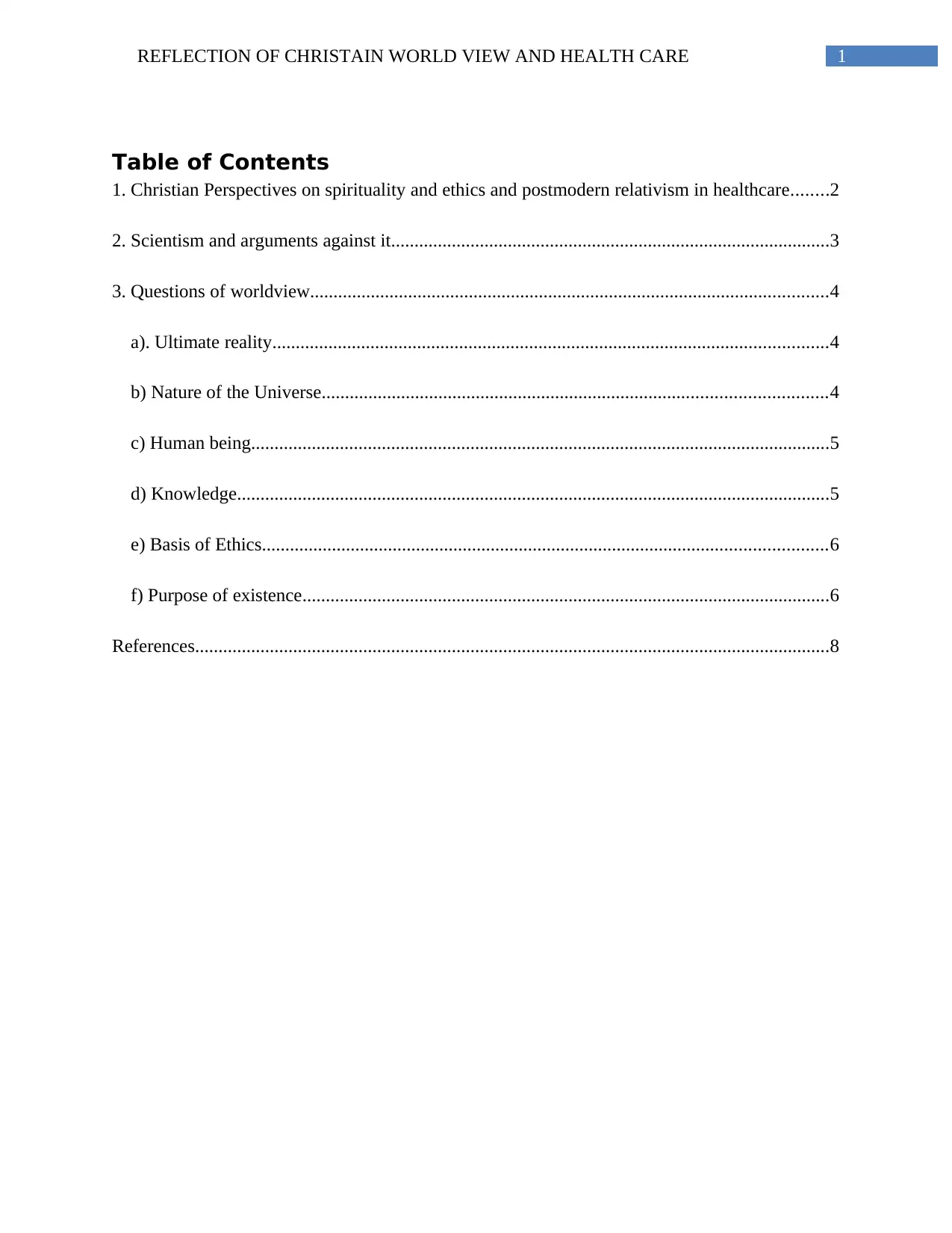
1REFLECTION OF CHRISTAIN WORLD VIEW AND HEALTH CARE
Table of Contents
1. Christian Perspectives on spirituality and ethics and postmodern relativism in healthcare........2
2. Scientism and arguments against it..............................................................................................3
3. Questions of worldview...............................................................................................................4
a). Ultimate reality.......................................................................................................................4
b) Nature of the Universe............................................................................................................4
c) Human being............................................................................................................................5
d) Knowledge...............................................................................................................................5
e) Basis of Ethics.........................................................................................................................6
f) Purpose of existence.................................................................................................................6
References........................................................................................................................................8
Table of Contents
1. Christian Perspectives on spirituality and ethics and postmodern relativism in healthcare........2
2. Scientism and arguments against it..............................................................................................3
3. Questions of worldview...............................................................................................................4
a). Ultimate reality.......................................................................................................................4
b) Nature of the Universe............................................................................................................4
c) Human being............................................................................................................................5
d) Knowledge...............................................................................................................................5
e) Basis of Ethics.........................................................................................................................6
f) Purpose of existence.................................................................................................................6
References........................................................................................................................................8
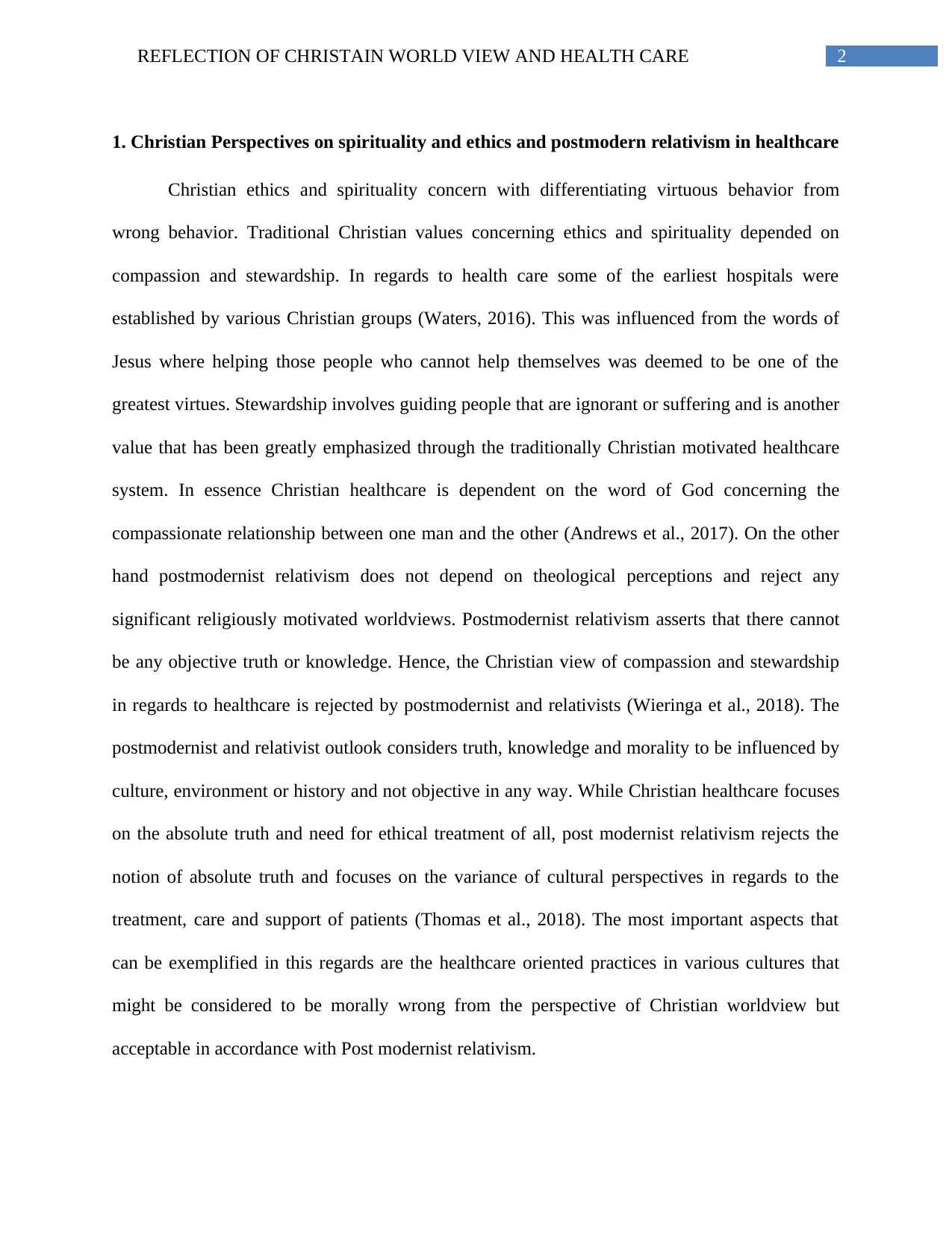
2REFLECTION OF CHRISTAIN WORLD VIEW AND HEALTH CARE
1. Christian Perspectives on spirituality and ethics and postmodern relativism in healthcare
Christian ethics and spirituality concern with differentiating virtuous behavior from
wrong behavior. Traditional Christian values concerning ethics and spirituality depended on
compassion and stewardship. In regards to health care some of the earliest hospitals were
established by various Christian groups (Waters, 2016). This was influenced from the words of
Jesus where helping those people who cannot help themselves was deemed to be one of the
greatest virtues. Stewardship involves guiding people that are ignorant or suffering and is another
value that has been greatly emphasized through the traditionally Christian motivated healthcare
system. In essence Christian healthcare is dependent on the word of God concerning the
compassionate relationship between one man and the other (Andrews et al., 2017). On the other
hand postmodernist relativism does not depend on theological perceptions and reject any
significant religiously motivated worldviews. Postmodernist relativism asserts that there cannot
be any objective truth or knowledge. Hence, the Christian view of compassion and stewardship
in regards to healthcare is rejected by postmodernist and relativists (Wieringa et al., 2018). The
postmodernist and relativist outlook considers truth, knowledge and morality to be influenced by
culture, environment or history and not objective in any way. While Christian healthcare focuses
on the absolute truth and need for ethical treatment of all, post modernist relativism rejects the
notion of absolute truth and focuses on the variance of cultural perspectives in regards to the
treatment, care and support of patients (Thomas et al., 2018). The most important aspects that
can be exemplified in this regards are the healthcare oriented practices in various cultures that
might be considered to be morally wrong from the perspective of Christian worldview but
acceptable in accordance with Post modernist relativism.
1. Christian Perspectives on spirituality and ethics and postmodern relativism in healthcare
Christian ethics and spirituality concern with differentiating virtuous behavior from
wrong behavior. Traditional Christian values concerning ethics and spirituality depended on
compassion and stewardship. In regards to health care some of the earliest hospitals were
established by various Christian groups (Waters, 2016). This was influenced from the words of
Jesus where helping those people who cannot help themselves was deemed to be one of the
greatest virtues. Stewardship involves guiding people that are ignorant or suffering and is another
value that has been greatly emphasized through the traditionally Christian motivated healthcare
system. In essence Christian healthcare is dependent on the word of God concerning the
compassionate relationship between one man and the other (Andrews et al., 2017). On the other
hand postmodernist relativism does not depend on theological perceptions and reject any
significant religiously motivated worldviews. Postmodernist relativism asserts that there cannot
be any objective truth or knowledge. Hence, the Christian view of compassion and stewardship
in regards to healthcare is rejected by postmodernist and relativists (Wieringa et al., 2018). The
postmodernist and relativist outlook considers truth, knowledge and morality to be influenced by
culture, environment or history and not objective in any way. While Christian healthcare focuses
on the absolute truth and need for ethical treatment of all, post modernist relativism rejects the
notion of absolute truth and focuses on the variance of cultural perspectives in regards to the
treatment, care and support of patients (Thomas et al., 2018). The most important aspects that
can be exemplified in this regards are the healthcare oriented practices in various cultures that
might be considered to be morally wrong from the perspective of Christian worldview but
acceptable in accordance with Post modernist relativism.
⊘ This is a preview!⊘
Do you want full access?
Subscribe today to unlock all pages.

Trusted by 1+ million students worldwide
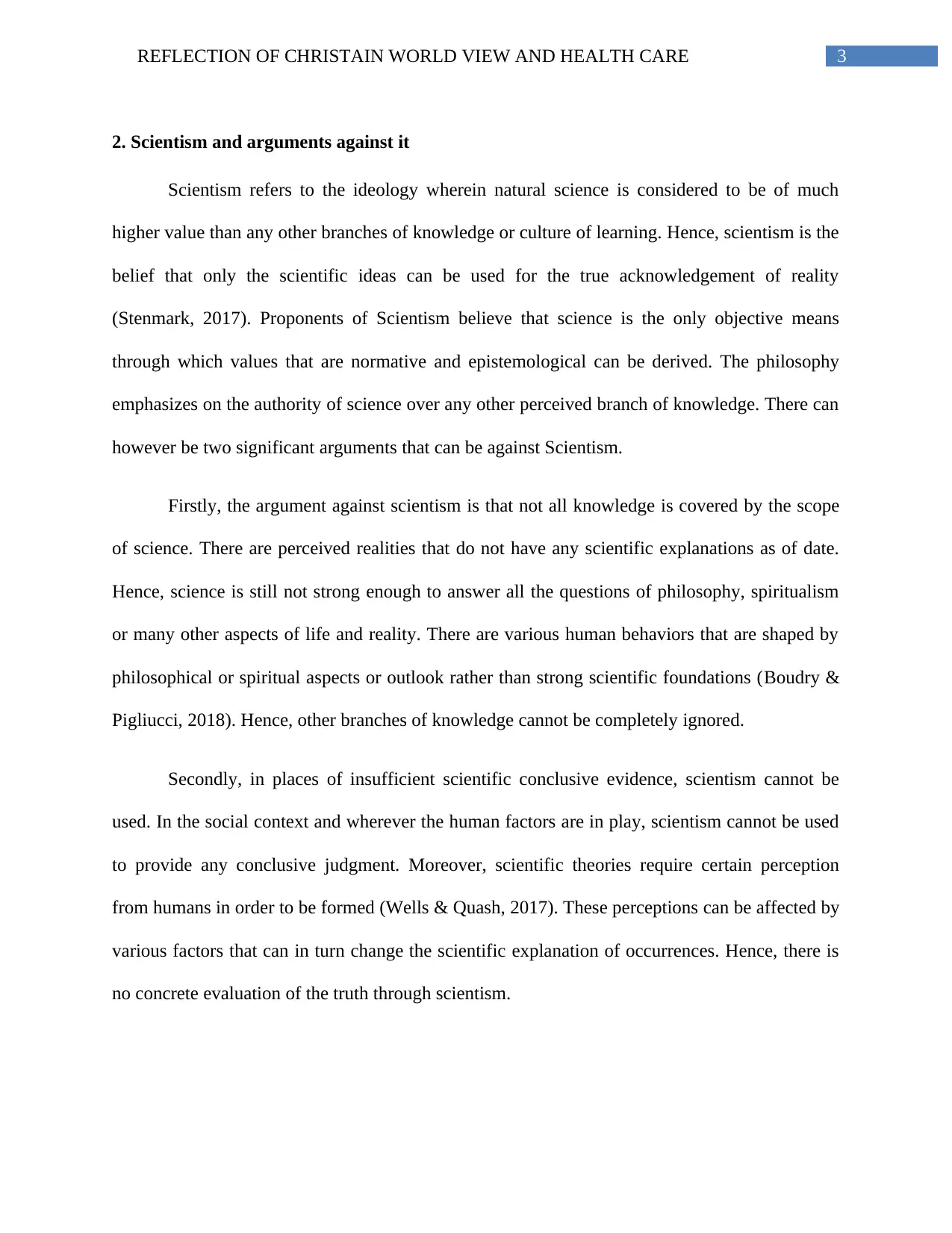
3REFLECTION OF CHRISTAIN WORLD VIEW AND HEALTH CARE
2. Scientism and arguments against it
Scientism refers to the ideology wherein natural science is considered to be of much
higher value than any other branches of knowledge or culture of learning. Hence, scientism is the
belief that only the scientific ideas can be used for the true acknowledgement of reality
(Stenmark, 2017). Proponents of Scientism believe that science is the only objective means
through which values that are normative and epistemological can be derived. The philosophy
emphasizes on the authority of science over any other perceived branch of knowledge. There can
however be two significant arguments that can be against Scientism.
Firstly, the argument against scientism is that not all knowledge is covered by the scope
of science. There are perceived realities that do not have any scientific explanations as of date.
Hence, science is still not strong enough to answer all the questions of philosophy, spiritualism
or many other aspects of life and reality. There are various human behaviors that are shaped by
philosophical or spiritual aspects or outlook rather than strong scientific foundations (Boudry &
Pigliucci, 2018). Hence, other branches of knowledge cannot be completely ignored.
Secondly, in places of insufficient scientific conclusive evidence, scientism cannot be
used. In the social context and wherever the human factors are in play, scientism cannot be used
to provide any conclusive judgment. Moreover, scientific theories require certain perception
from humans in order to be formed (Wells & Quash, 2017). These perceptions can be affected by
various factors that can in turn change the scientific explanation of occurrences. Hence, there is
no concrete evaluation of the truth through scientism.
2. Scientism and arguments against it
Scientism refers to the ideology wherein natural science is considered to be of much
higher value than any other branches of knowledge or culture of learning. Hence, scientism is the
belief that only the scientific ideas can be used for the true acknowledgement of reality
(Stenmark, 2017). Proponents of Scientism believe that science is the only objective means
through which values that are normative and epistemological can be derived. The philosophy
emphasizes on the authority of science over any other perceived branch of knowledge. There can
however be two significant arguments that can be against Scientism.
Firstly, the argument against scientism is that not all knowledge is covered by the scope
of science. There are perceived realities that do not have any scientific explanations as of date.
Hence, science is still not strong enough to answer all the questions of philosophy, spiritualism
or many other aspects of life and reality. There are various human behaviors that are shaped by
philosophical or spiritual aspects or outlook rather than strong scientific foundations (Boudry &
Pigliucci, 2018). Hence, other branches of knowledge cannot be completely ignored.
Secondly, in places of insufficient scientific conclusive evidence, scientism cannot be
used. In the social context and wherever the human factors are in play, scientism cannot be used
to provide any conclusive judgment. Moreover, scientific theories require certain perception
from humans in order to be formed (Wells & Quash, 2017). These perceptions can be affected by
various factors that can in turn change the scientific explanation of occurrences. Hence, there is
no concrete evaluation of the truth through scientism.
Paraphrase This Document
Need a fresh take? Get an instant paraphrase of this document with our AI Paraphraser
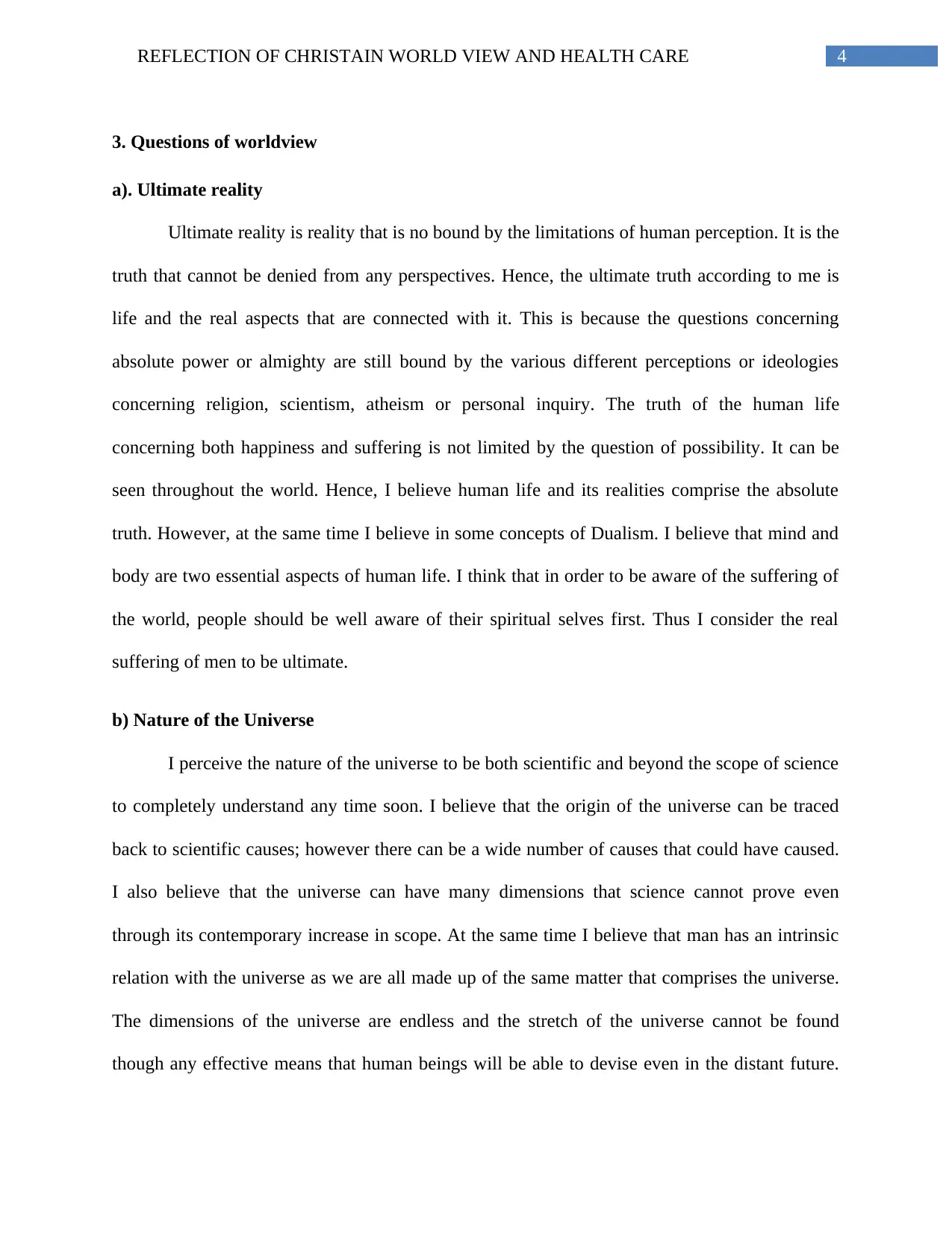
4REFLECTION OF CHRISTAIN WORLD VIEW AND HEALTH CARE
3. Questions of worldview
a). Ultimate reality
Ultimate reality is reality that is no bound by the limitations of human perception. It is the
truth that cannot be denied from any perspectives. Hence, the ultimate truth according to me is
life and the real aspects that are connected with it. This is because the questions concerning
absolute power or almighty are still bound by the various different perceptions or ideologies
concerning religion, scientism, atheism or personal inquiry. The truth of the human life
concerning both happiness and suffering is not limited by the question of possibility. It can be
seen throughout the world. Hence, I believe human life and its realities comprise the absolute
truth. However, at the same time I believe in some concepts of Dualism. I believe that mind and
body are two essential aspects of human life. I think that in order to be aware of the suffering of
the world, people should be well aware of their spiritual selves first. Thus I consider the real
suffering of men to be ultimate.
b) Nature of the Universe
I perceive the nature of the universe to be both scientific and beyond the scope of science
to completely understand any time soon. I believe that the origin of the universe can be traced
back to scientific causes; however there can be a wide number of causes that could have caused.
I also believe that the universe can have many dimensions that science cannot prove even
through its contemporary increase in scope. At the same time I believe that man has an intrinsic
relation with the universe as we are all made up of the same matter that comprises the universe.
The dimensions of the universe are endless and the stretch of the universe cannot be found
though any effective means that human beings will be able to devise even in the distant future.
3. Questions of worldview
a). Ultimate reality
Ultimate reality is reality that is no bound by the limitations of human perception. It is the
truth that cannot be denied from any perspectives. Hence, the ultimate truth according to me is
life and the real aspects that are connected with it. This is because the questions concerning
absolute power or almighty are still bound by the various different perceptions or ideologies
concerning religion, scientism, atheism or personal inquiry. The truth of the human life
concerning both happiness and suffering is not limited by the question of possibility. It can be
seen throughout the world. Hence, I believe human life and its realities comprise the absolute
truth. However, at the same time I believe in some concepts of Dualism. I believe that mind and
body are two essential aspects of human life. I think that in order to be aware of the suffering of
the world, people should be well aware of their spiritual selves first. Thus I consider the real
suffering of men to be ultimate.
b) Nature of the Universe
I perceive the nature of the universe to be both scientific and beyond the scope of science
to completely understand any time soon. I believe that the origin of the universe can be traced
back to scientific causes; however there can be a wide number of causes that could have caused.
I also believe that the universe can have many dimensions that science cannot prove even
through its contemporary increase in scope. At the same time I believe that man has an intrinsic
relation with the universe as we are all made up of the same matter that comprises the universe.
The dimensions of the universe are endless and the stretch of the universe cannot be found
though any effective means that human beings will be able to devise even in the distant future.
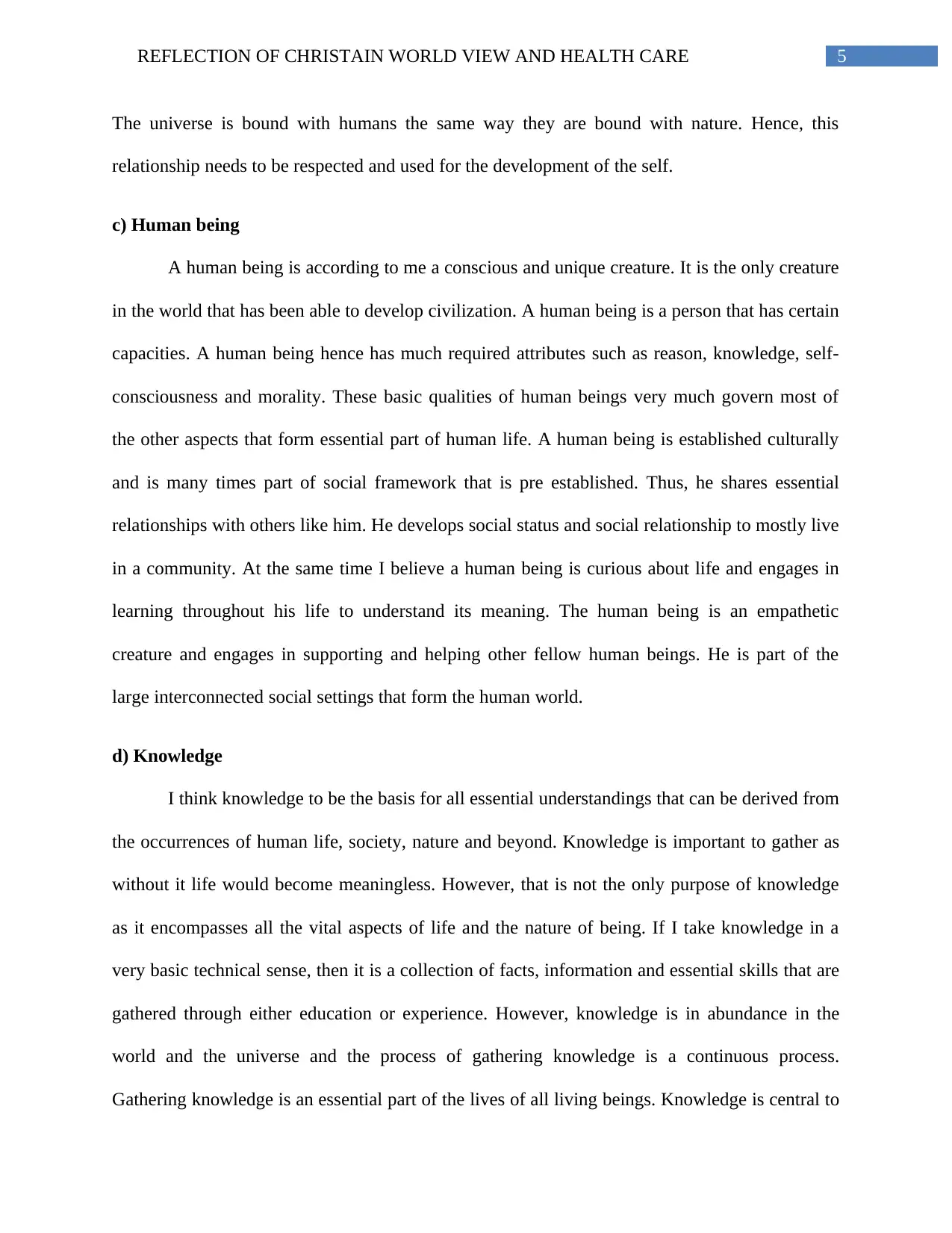
5REFLECTION OF CHRISTAIN WORLD VIEW AND HEALTH CARE
The universe is bound with humans the same way they are bound with nature. Hence, this
relationship needs to be respected and used for the development of the self.
c) Human being
A human being is according to me a conscious and unique creature. It is the only creature
in the world that has been able to develop civilization. A human being is a person that has certain
capacities. A human being hence has much required attributes such as reason, knowledge, self-
consciousness and morality. These basic qualities of human beings very much govern most of
the other aspects that form essential part of human life. A human being is established culturally
and is many times part of social framework that is pre established. Thus, he shares essential
relationships with others like him. He develops social status and social relationship to mostly live
in a community. At the same time I believe a human being is curious about life and engages in
learning throughout his life to understand its meaning. The human being is an empathetic
creature and engages in supporting and helping other fellow human beings. He is part of the
large interconnected social settings that form the human world.
d) Knowledge
I think knowledge to be the basis for all essential understandings that can be derived from
the occurrences of human life, society, nature and beyond. Knowledge is important to gather as
without it life would become meaningless. However, that is not the only purpose of knowledge
as it encompasses all the vital aspects of life and the nature of being. If I take knowledge in a
very basic technical sense, then it is a collection of facts, information and essential skills that are
gathered through either education or experience. However, knowledge is in abundance in the
world and the universe and the process of gathering knowledge is a continuous process.
Gathering knowledge is an essential part of the lives of all living beings. Knowledge is central to
The universe is bound with humans the same way they are bound with nature. Hence, this
relationship needs to be respected and used for the development of the self.
c) Human being
A human being is according to me a conscious and unique creature. It is the only creature
in the world that has been able to develop civilization. A human being is a person that has certain
capacities. A human being hence has much required attributes such as reason, knowledge, self-
consciousness and morality. These basic qualities of human beings very much govern most of
the other aspects that form essential part of human life. A human being is established culturally
and is many times part of social framework that is pre established. Thus, he shares essential
relationships with others like him. He develops social status and social relationship to mostly live
in a community. At the same time I believe a human being is curious about life and engages in
learning throughout his life to understand its meaning. The human being is an empathetic
creature and engages in supporting and helping other fellow human beings. He is part of the
large interconnected social settings that form the human world.
d) Knowledge
I think knowledge to be the basis for all essential understandings that can be derived from
the occurrences of human life, society, nature and beyond. Knowledge is important to gather as
without it life would become meaningless. However, that is not the only purpose of knowledge
as it encompasses all the vital aspects of life and the nature of being. If I take knowledge in a
very basic technical sense, then it is a collection of facts, information and essential skills that are
gathered through either education or experience. However, knowledge is in abundance in the
world and the universe and the process of gathering knowledge is a continuous process.
Gathering knowledge is an essential part of the lives of all living beings. Knowledge is central to
⊘ This is a preview!⊘
Do you want full access?
Subscribe today to unlock all pages.

Trusted by 1+ million students worldwide
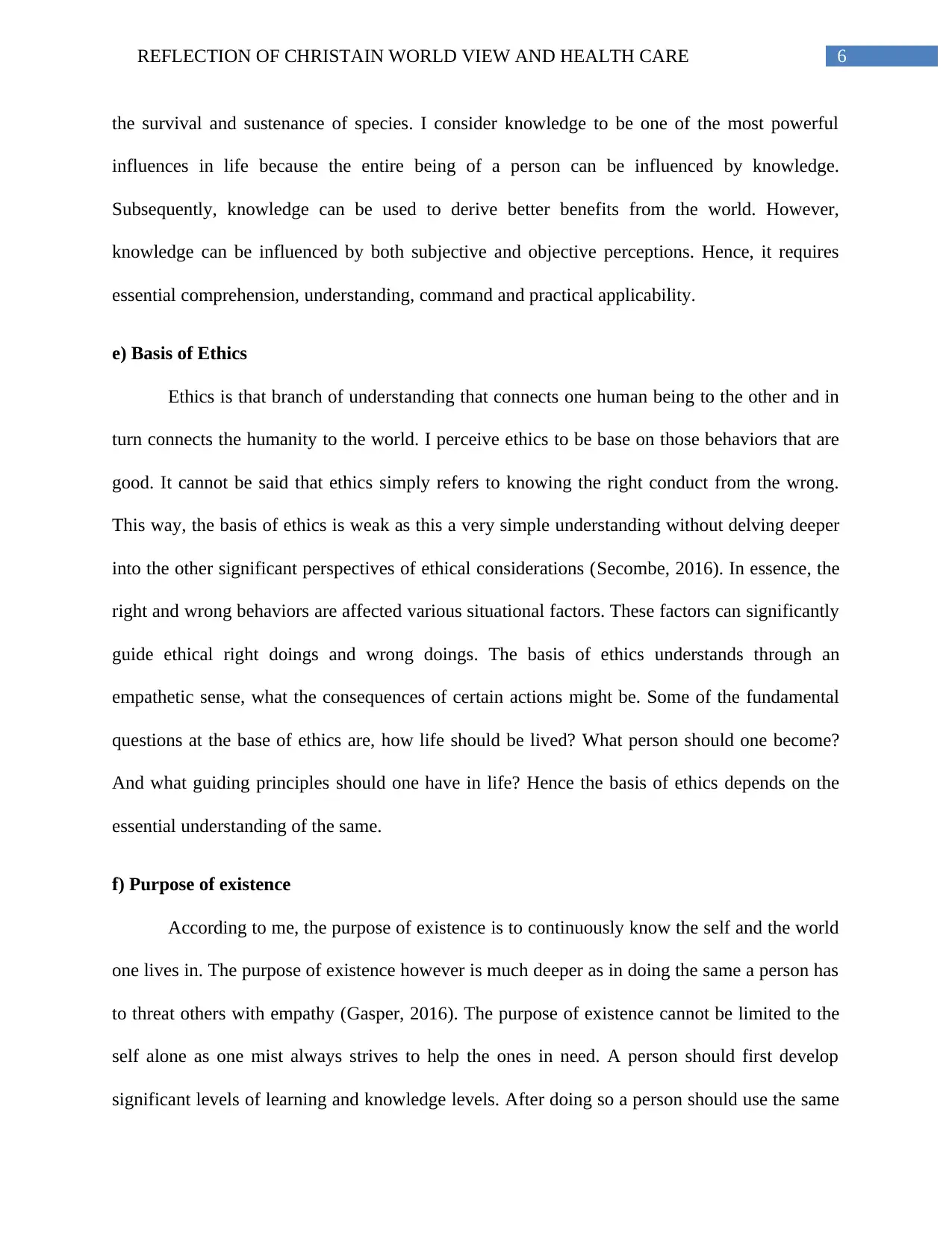
6REFLECTION OF CHRISTAIN WORLD VIEW AND HEALTH CARE
the survival and sustenance of species. I consider knowledge to be one of the most powerful
influences in life because the entire being of a person can be influenced by knowledge.
Subsequently, knowledge can be used to derive better benefits from the world. However,
knowledge can be influenced by both subjective and objective perceptions. Hence, it requires
essential comprehension, understanding, command and practical applicability.
e) Basis of Ethics
Ethics is that branch of understanding that connects one human being to the other and in
turn connects the humanity to the world. I perceive ethics to be base on those behaviors that are
good. It cannot be said that ethics simply refers to knowing the right conduct from the wrong.
This way, the basis of ethics is weak as this a very simple understanding without delving deeper
into the other significant perspectives of ethical considerations (Secombe, 2016). In essence, the
right and wrong behaviors are affected various situational factors. These factors can significantly
guide ethical right doings and wrong doings. The basis of ethics understands through an
empathetic sense, what the consequences of certain actions might be. Some of the fundamental
questions at the base of ethics are, how life should be lived? What person should one become?
And what guiding principles should one have in life? Hence the basis of ethics depends on the
essential understanding of the same.
f) Purpose of existence
According to me, the purpose of existence is to continuously know the self and the world
one lives in. The purpose of existence however is much deeper as in doing the same a person has
to threat others with empathy (Gasper, 2016). The purpose of existence cannot be limited to the
self alone as one mist always strives to help the ones in need. A person should first develop
significant levels of learning and knowledge levels. After doing so a person should use the same
the survival and sustenance of species. I consider knowledge to be one of the most powerful
influences in life because the entire being of a person can be influenced by knowledge.
Subsequently, knowledge can be used to derive better benefits from the world. However,
knowledge can be influenced by both subjective and objective perceptions. Hence, it requires
essential comprehension, understanding, command and practical applicability.
e) Basis of Ethics
Ethics is that branch of understanding that connects one human being to the other and in
turn connects the humanity to the world. I perceive ethics to be base on those behaviors that are
good. It cannot be said that ethics simply refers to knowing the right conduct from the wrong.
This way, the basis of ethics is weak as this a very simple understanding without delving deeper
into the other significant perspectives of ethical considerations (Secombe, 2016). In essence, the
right and wrong behaviors are affected various situational factors. These factors can significantly
guide ethical right doings and wrong doings. The basis of ethics understands through an
empathetic sense, what the consequences of certain actions might be. Some of the fundamental
questions at the base of ethics are, how life should be lived? What person should one become?
And what guiding principles should one have in life? Hence the basis of ethics depends on the
essential understanding of the same.
f) Purpose of existence
According to me, the purpose of existence is to continuously know the self and the world
one lives in. The purpose of existence however is much deeper as in doing the same a person has
to threat others with empathy (Gasper, 2016). The purpose of existence cannot be limited to the
self alone as one mist always strives to help the ones in need. A person should first develop
significant levels of learning and knowledge levels. After doing so a person should use the same
Paraphrase This Document
Need a fresh take? Get an instant paraphrase of this document with our AI Paraphraser
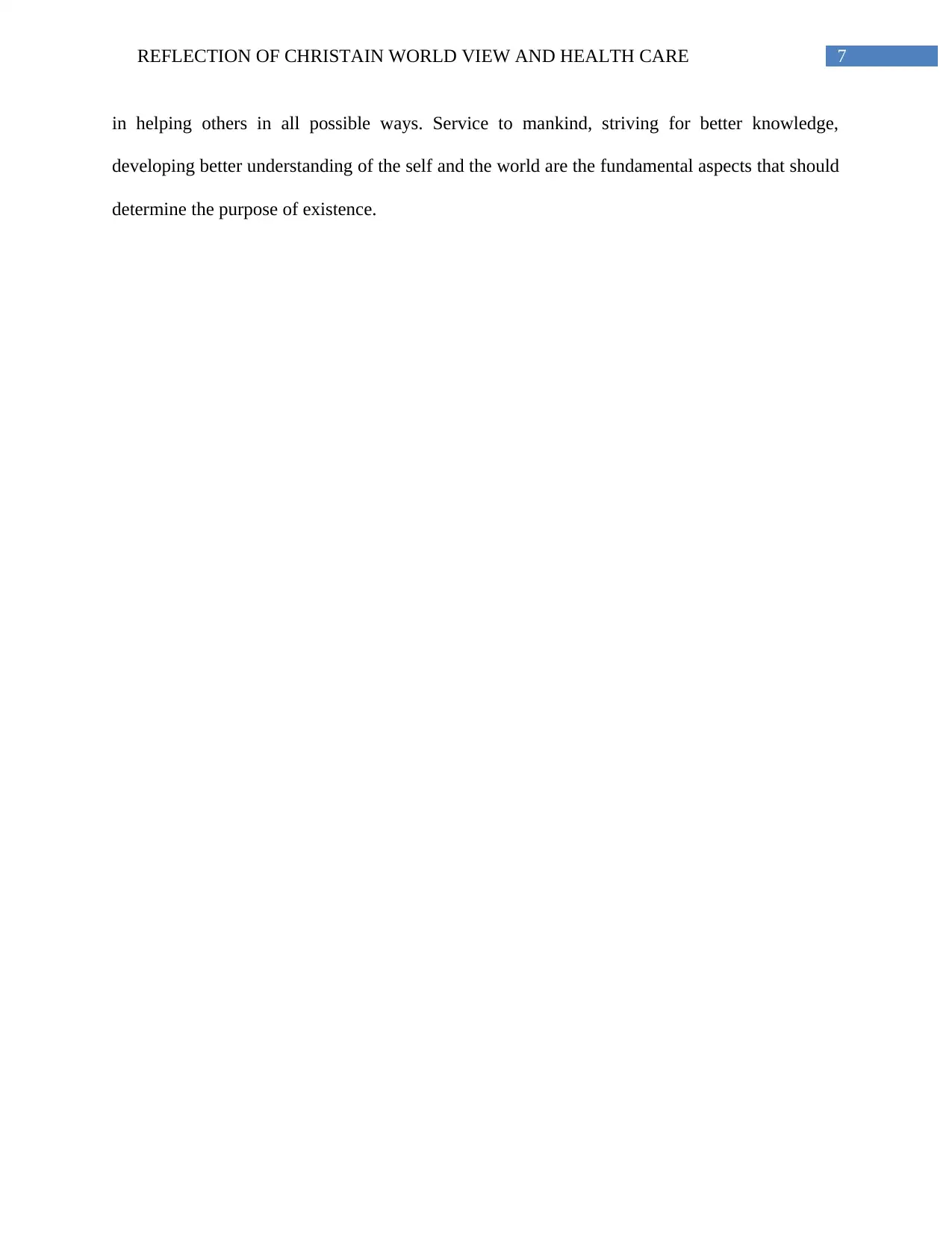
7REFLECTION OF CHRISTAIN WORLD VIEW AND HEALTH CARE
in helping others in all possible ways. Service to mankind, striving for better knowledge,
developing better understanding of the self and the world are the fundamental aspects that should
determine the purpose of existence.
in helping others in all possible ways. Service to mankind, striving for better knowledge,
developing better understanding of the self and the world are the fundamental aspects that should
determine the purpose of existence.
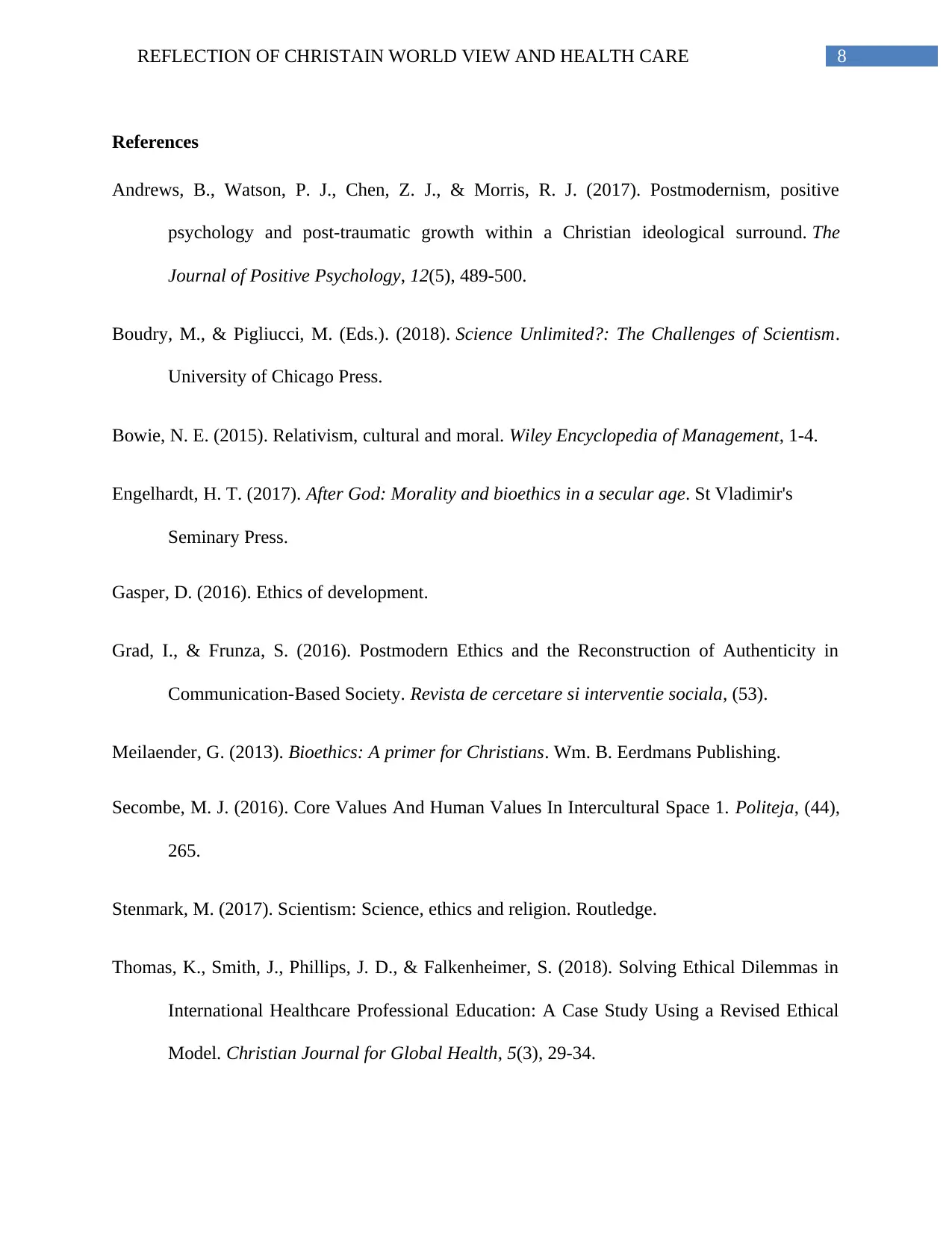
8REFLECTION OF CHRISTAIN WORLD VIEW AND HEALTH CARE
References
Andrews, B., Watson, P. J., Chen, Z. J., & Morris, R. J. (2017). Postmodernism, positive
psychology and post-traumatic growth within a Christian ideological surround. The
Journal of Positive Psychology, 12(5), 489-500.
Boudry, M., & Pigliucci, M. (Eds.). (2018). Science Unlimited?: The Challenges of Scientism.
University of Chicago Press.
Bowie, N. E. (2015). Relativism, cultural and moral. Wiley Encyclopedia of Management, 1-4.
Engelhardt, H. T. (2017). After God: Morality and bioethics in a secular age. St Vladimir's
Seminary Press.
Gasper, D. (2016). Ethics of development.
Grad, I., & Frunza, S. (2016). Postmodern Ethics and the Reconstruction of Authenticity in
Communication-Based Society. Revista de cercetare si interventie sociala, (53).
Meilaender, G. (2013). Bioethics: A primer for Christians. Wm. B. Eerdmans Publishing.
Secombe, M. J. (2016). Core Values And Human Values In Intercultural Space 1. Politeja, (44),
265.
Stenmark, M. (2017). Scientism: Science, ethics and religion. Routledge.
Thomas, K., Smith, J., Phillips, J. D., & Falkenheimer, S. (2018). Solving Ethical Dilemmas in
International Healthcare Professional Education: A Case Study Using a Revised Ethical
Model. Christian Journal for Global Health, 5(3), 29-34.
References
Andrews, B., Watson, P. J., Chen, Z. J., & Morris, R. J. (2017). Postmodernism, positive
psychology and post-traumatic growth within a Christian ideological surround. The
Journal of Positive Psychology, 12(5), 489-500.
Boudry, M., & Pigliucci, M. (Eds.). (2018). Science Unlimited?: The Challenges of Scientism.
University of Chicago Press.
Bowie, N. E. (2015). Relativism, cultural and moral. Wiley Encyclopedia of Management, 1-4.
Engelhardt, H. T. (2017). After God: Morality and bioethics in a secular age. St Vladimir's
Seminary Press.
Gasper, D. (2016). Ethics of development.
Grad, I., & Frunza, S. (2016). Postmodern Ethics and the Reconstruction of Authenticity in
Communication-Based Society. Revista de cercetare si interventie sociala, (53).
Meilaender, G. (2013). Bioethics: A primer for Christians. Wm. B. Eerdmans Publishing.
Secombe, M. J. (2016). Core Values And Human Values In Intercultural Space 1. Politeja, (44),
265.
Stenmark, M. (2017). Scientism: Science, ethics and religion. Routledge.
Thomas, K., Smith, J., Phillips, J. D., & Falkenheimer, S. (2018). Solving Ethical Dilemmas in
International Healthcare Professional Education: A Case Study Using a Revised Ethical
Model. Christian Journal for Global Health, 5(3), 29-34.
⊘ This is a preview!⊘
Do you want full access?
Subscribe today to unlock all pages.

Trusted by 1+ million students worldwide
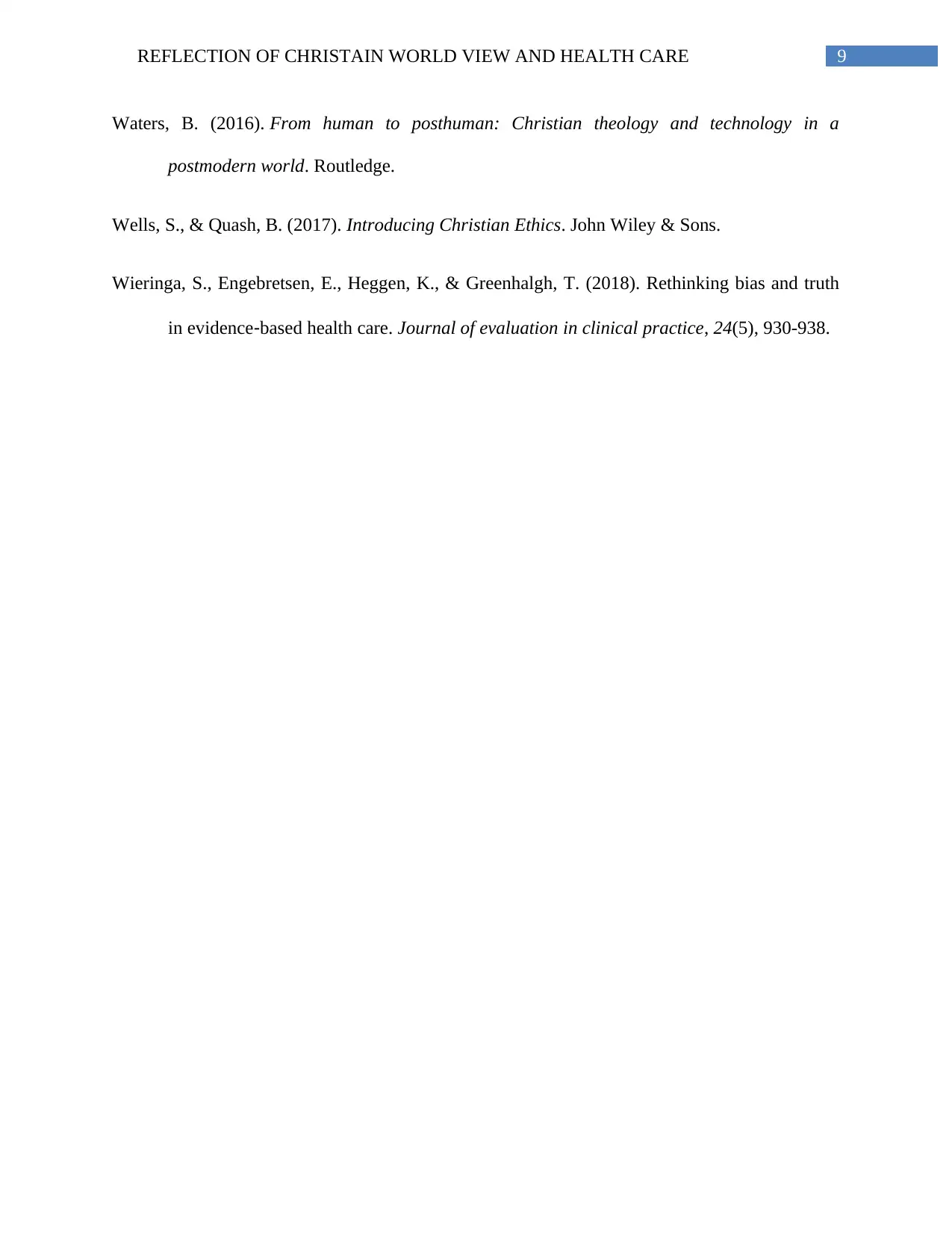
9REFLECTION OF CHRISTAIN WORLD VIEW AND HEALTH CARE
Waters, B. (2016). From human to posthuman: Christian theology and technology in a
postmodern world. Routledge.
Wells, S., & Quash, B. (2017). Introducing Christian Ethics. John Wiley & Sons.
Wieringa, S., Engebretsen, E., Heggen, K., & Greenhalgh, T. (2018). Rethinking bias and truth
in evidence‐based health care. Journal of evaluation in clinical practice, 24(5), 930-938.
Waters, B. (2016). From human to posthuman: Christian theology and technology in a
postmodern world. Routledge.
Wells, S., & Quash, B. (2017). Introducing Christian Ethics. John Wiley & Sons.
Wieringa, S., Engebretsen, E., Heggen, K., & Greenhalgh, T. (2018). Rethinking bias and truth
in evidence‐based health care. Journal of evaluation in clinical practice, 24(5), 930-938.
1 out of 10
Related Documents
Your All-in-One AI-Powered Toolkit for Academic Success.
+13062052269
info@desklib.com
Available 24*7 on WhatsApp / Email
![[object Object]](/_next/static/media/star-bottom.7253800d.svg)
Unlock your academic potential
Copyright © 2020–2025 A2Z Services. All Rights Reserved. Developed and managed by ZUCOL.





![Reflective Essay on Religion, Spirituality, and Ethics - [Course Name]](/_next/image/?url=https%3A%2F%2Fdesklib.com%2Fmedia%2Fimages%2Fkp%2F5be92086d07d49f99eea006b30d77d2a.jpg&w=256&q=75)